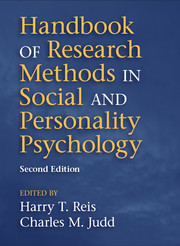Book contents
- Handbook of Research Methods in Social and Personality Psychology
- Handbook of Research Methods in Social and Personality Psychology
- Copyright page
- Contents
- Contributors
- Introduction to the Second Edition
- Introduction to the First Edition
- Chapter one Scratch an Itch with a Brick
- Part one Design and Inference Considerations
- Part two Procedural Possibilities
- Part three Data Analytic Strategies
- Chapter eighteen Measurement
- Chapter nineteen Exploring Causal and Noncausal Hypotheses in Nonexperimental Data
- Chapter twenty Advanced Psychometrics
- Chapter twenty-one Multilevel and Longitudinal Modeling
- Chapter twenty-two The Design and Analysis of Data from Dyads and Groups
- Chapter twenty-three Nasty Data
- Chapter twenty-four Missing Data Analysis
- Chapter twenty-five Mediation and Moderation
- Chapter twenty-six Meta-Analysis of Research in Social and Personality Psychology
- Author Index
- Subject Index
Chapter nineteen - Exploring Causal and Noncausal Hypotheses in Nonexperimental Data
from Part three - Data Analytic Strategies
Published online by Cambridge University Press: 05 June 2014
- Handbook of Research Methods in Social and Personality Psychology
- Handbook of Research Methods in Social and Personality Psychology
- Copyright page
- Contents
- Contributors
- Introduction to the Second Edition
- Introduction to the First Edition
- Chapter one Scratch an Itch with a Brick
- Part one Design and Inference Considerations
- Part two Procedural Possibilities
- Part three Data Analytic Strategies
- Chapter eighteen Measurement
- Chapter nineteen Exploring Causal and Noncausal Hypotheses in Nonexperimental Data
- Chapter twenty Advanced Psychometrics
- Chapter twenty-one Multilevel and Longitudinal Modeling
- Chapter twenty-two The Design and Analysis of Data from Dyads and Groups
- Chapter twenty-three Nasty Data
- Chapter twenty-four Missing Data Analysis
- Chapter twenty-five Mediation and Moderation
- Chapter twenty-six Meta-Analysis of Research in Social and Personality Psychology
- Author Index
- Subject Index
Summary
Keywords
Information
- Type
- Chapter
- Information
- Publisher: Cambridge University PressPrint publication year: 2014
Accessibility standard: Unknown
Why this information is here
This section outlines the accessibility features of this content - including support for screen readers, full keyboard navigation and high-contrast display options. This may not be relevant for you.Accessibility Information
- 7
- Cited by
